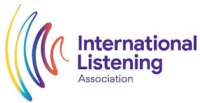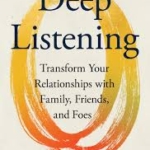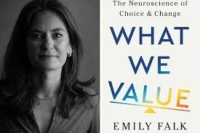
Last week, two strands of my life unexpectedly came together in ways that will take our Peacebuilding Starts at Home work forward in unexpected ways.
 First, I attended the annual conference of the International Listening Association. I had never heard of it before Annie Rappeport asked me to give a talk about Peacebuilding Starts at Home and the rest of what the Alliance for Peacebuilding (AfP) does which she contributes to in any number of ways, especially on college campuses.
First, I attended the annual conference of the International Listening Association. I had never heard of it before Annie Rappeport asked me to give a talk about Peacebuilding Starts at Home and the rest of what the Alliance for Peacebuilding (AfP) does which she contributes to in any number of ways, especially on college campuses.

Meanwhile, I found myself (coincidentally? A term that my therapist dislikes) reading a couple of books on how people open and then change their minds on big ticket items—or don’t as is more typically the case. I started with Sarah Stein Lubrano’s new Don’t Talk About Politics and a book that influenced her thinking a lot, David McRaney’s How Minds Change, which I already owned but hadn’t read. Shame on me.
Start By Listening
I was totally flummoxed when Annie asked me to give the talk. I think of myself as a good listener, but I’m a person of action. In fact, I turned to Lubrano and McRaney because it’s my job to convince people to change their minds on hot-button issues of the day and then help them find on ramps that would turn them into Peacebuilding Starts at Home activists in that could change the world.
ç\
Sure, I knew that active listening what an important part of any peacebuilder’s arsenal.
But, I hadn’t thought about stressing ways of developing our listening skills as being at the heart of our efforts until I read Emily Kasriel’s Deep Listening which I wrote about a couple of weeks ago.

Her book convinced me that my colleagues and I had to help the people we work with learn to listen better so that their interlocutors can begin to take their points of view more seriously, open their minds to new ways of thinking, and more.
Listening for Change
Still, it wasn’t clear what my entry point should be until I walked into the student union at the University of Maryland where we met.
To paraphrase the title of that earlier post, I was surprised by how many of the people in the room were not just interested in listening for listening’s sake but for how we can advance social change—and changing minds—by listening better.
Within minutes of getting to campus, I had already satisfied one of my main criteria for a successful conference—meeting at least two people I wanted to get to know better.
That started with Annie whose work I had mostly admired from afar when she shared the stage with others. Now, as co-chair of the planning committee, I saw just how amazing she already is and how big a role she can plan in our community going forward. That started with her luring University of Maryland System Chancellor, Jay Perman, to give a keynote talk. They had met when Annie was on a mental health task force that Perman had convened when she was a PhD student. He became a member of the Annie Rappeport fan club, so he was delighted to take an hour from has maniacal schedule to come talk to a group that nothing to do with his university or his profession. He held us spellbound talking about the central role listening plays in his work as a physician, a profession he continues to practice when he sees pediatric patients an afternoon a week. Just as impressive was the fact that the students and faculty members she has worked with at Maryland and the University of Virginia over the years just adored her becaue she practices what she preaches when it comes to listening and peacebuilding.
It wasn’t just Annie. The conference was filled with people I had never met before who had mastered any number of ways listening that can serve as a powerful tool for social change because active or deep listening can indeed open minds. There were democracy trainers, an Appreciative Inquiry professor, leadership experts, and even a couple who have just published a book on how listening has helped make the drag community more welcomed in Charlotte NC.

Most of all, Gretchen and I got to spend an entire afternoon with Vinay Orekondy of Better Together America. I had met his cofounder, Caleb Christen, at another conference about a year ago. Frankly, I hadn’t realized just how much they could accomplish in less than a year’s time.
What they have done in that short span of time is set up almost fifty civic hubs in communities around the country. Each one will be different because each will start with a handful of local social entrepreneurs that the BTA team happened to find. Each will pursue its own interests and define local projects that can serve as a kind of social infrastructure that can be the launching pad for both the adoption of new cultural norms and the passage of new public policies.
And, of course that means listening, both by the BTA staff when they meet the local activists and then by those activists as they build their own networks. Coincidentally, we have discovered Falls Church Forward, which is attempting to do some of that sort on its own in the small city (as it likes to call itself) that we just moved into.
Why Should You Care?
On one level, the answer to my question should be obvious. Whether you are a world famous physician like Jay Perman or a first time camp counselor as I was when I was eighteen, it pays to listen.
It makes your job easier in the short term. And the better you get at listening in general, the more effective you become in general.
And sometimes it pays off in ways you never imagined. Thus, the first student I met when I started my first teaching job at Colby had also been one of my first campers a decade earlier. I clicked with Vinay in part because it became clear to me during his talk that we both worked with the same person in Scottsbluff, Nebraska. In each case, I had listened and remembered what I heard and learned so that I could use those “data” in unexpected ways at an unanticipated time in an unknown future.
That led to the point that I tried to stress in my talk which I was still putting together as Vinay, Gretchen, and I walked down the stairs to the design studio where it took place. As I suggested, it’s hard to persuade people to follow your lead and become active in something like Peacebuilding Starts at Home unless you truly listen to them first. Both intellectually and otherwise, it really helps to make it clear to the people you work with that you listen to them and take them seriously in every sense of the term.
That’s especially true if you are working with people you disagree with, which is something I do all the time. I do that by using lines like “tell me more” through which I encourage them to explain why they think the way that they do. It’s probably even more important to make it clear through eye contact or smiling or even poking fun at yourself that you take them seriously precisely because you reach different conclusions when looking at the same data.
What Kasriel, Lubrano, McRaney, and dozens of authors have shown us is that you stand next to no chance of persuading anyone of anything unless you not just listen in the ways that I learned about this weekend but make it clear that you cherish the time that you are spending with them.
From Small Talk to Big Ideas
Then, on Sunday, I listened to a podcast in which the Next Big Idea Club’s Rufus Griscom interviewed the neuroscientist, Emily Falk, about her new book, What We Value. During the conversation, Rufus mentioned that his wife hates the small talk that seems to dominate cocktail parties and other social get togethers at which people who don’t knew each other get together.
 My attention was riveted even before Falk replied because I used to hate those encounters, too. But then Falk nailed something on the head that I had already sort of mastered without being able to put it into words. If you meet someone at a cocktail party or some such event and have no idea what they are like, just ask a question that lets them tell you who they are. In their own terms.
My attention was riveted even before Falk replied because I used to hate those encounters, too. But then Falk nailed something on the head that I had already sort of mastered without being able to put it into words. If you meet someone at a cocktail party or some such event and have no idea what they are like, just ask a question that lets them tell you who they are. In their own terms.
Where are you from? What do you do? What do you like to do?
How are you enjoying living in The Oaks (where we have been for the last eight weeks)? Did you go to Navy? I used that last one with a new neighbor who was on our building’s patio one afternoon. Turns out that he hadn’t, but as he talked about what he had done, we discovered that he used to work with our friend Liz Hume’s husband. We never explicitly got to anything like peacebuilding starts at home, but because do does know what Liz does through Richard, we had something we can build off of the next time we meet while grilling on the communal barbecues.
 What I learned from “the listerns” and from Falk is, frankly, very easy. Ask just about any open ended question that demonstrates that you are interested in the other person and let them take the conversation wherever they want.
What I learned from “the listerns” and from Falk is, frankly, very easy. Ask just about any open ended question that demonstrates that you are interested in the other person and let them take the conversation wherever they want.
And then listen.
And be ready to let your interlocutor “tell me more” by asking questions like “why do you see things that way?”
You don’t have to have professional training the way my new friends do.
Even though it does help.
The views and opinions expressed in this article are those of the author and do not necessarily reflect the official policy or position of the Alliance for Peacebuilding or its members.





